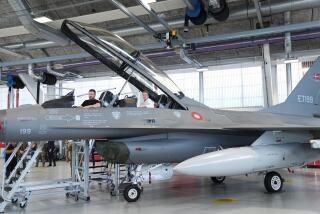S. Korea Dumps McDonnell Jets for General Dynamics’
- Share via
South Korea canceled its order to buy 120 McDonnell Douglas F-18 jet fighters Thursday, selecting instead the less costly General Dynamics F-16 in a deal potentially worth $5.2 billion.
The reversal, which came as a stunning surprise not only to industry observers but even to McDonnell, could help General Dynamics sustain employment at its Ft. Worth plant, which has been hit hard by layoffs over the past year.
Under its agreement, South Korea will produce most of the F-16s with parts imported from the United States. Korean Defense Minister Lee Jong-koo was quoted in wire service reports as saying the F-16 order will cost about $1.4 billion less than the same number of F-18s.
Either plane would have cost far less had South Korea simply bought standard aircraft produced in the United States, but it is seeking through the purchase to enhance the technical capabilities of its aerospace industry, U.S. experts said. Samsung Aerospace Industries, which builds parts for Boeing and engine-maker Pratt & Whitney, has been designated the main contractor for the Korean portion of the work.
General Dynamics Vice President Peter Connolly said Thursday that the number of aircraft to be built in South Korea will be determined in later negotiations, but fewer than half of the aircraft are likely to be produced in Ft. Worth, assuming the deal is approved.
Political controversy over the potential loss of U.S technology has delayed congressional approval of the 1989 sale of the F-18. In the meantime, the cost increased, prompting the Koreans to reconsider the deal. Congress must also approve the General Dynamics deal.
“The Korean government had sticker shock when they found out what their F-18s were going to cost them,” General Dynamics spokesman Joe Stout said. “So, they reopened the competition.”
The F-16 has established itself firmly as the jet fighter of choice among air forces around the world. General Dynamics has delivered 1,010 F-16s to foreign armed services and has orders for an additional 314, not including the Korean order.
By contrast, the F-18 has won 359 orders from Spain, Australia, Kuwait, Canada and Switzerland. But the Swiss are also reconsidering their order for 34 of the jets, dissatisfied with the cost.
The dual engine F-18 is widely regarded as a more capable fighter, carrying a heavier payload and a more powerful radar system than the single engine F-16. Experts disagree about which aircraft is more maneuverable.
Los Angeles-based Northrop Corp. builds 40% of the F-18 at its facilities in El Segundo, employing about 4,000. Northrop spokesman Les Daly said the Korean cancellation will have no effect on Northrop. Only a dozen Northrop employees were working directly on the Korean order, he said.
The Korean order is more critical to General Dynamics than McDonnell, however. The Air Force plans to stop buying F-16s in fiscal 1993, taking the final delivery in 1993.
While the Air Force plans to terminate the F-16, however, the Navy plans to upgrade the F-18 at a cost of $1.5 billion in 1992 and 1993 and continue production of that fighter through the end of the decade. McDonnell has 7,000 workers assigned to the F-18 program and the loss of the Korean sale will not affect that number, according to company spokesman James Reed.
“Obviously we are greatly disappointed, but we remain convinced that the F-18 best meets the national security, industrial and economic requirement of the Republic of Korea,” Reed said. Reed said the loss would have no effect on the firm’s 7,000 St. Louis jobs on the F-18 program.
Aerospace analyst Lawrence Harris of Kemper Securities Group said that while the $5.2-billion order was a significant loss to McDonnell, the outcome of two military aircraft competitions in the next few months will be far more important to its future.
The Army will select a winner of the LH helicopter competition and the Air Force of its advanced tactical fighter competition. The loss of both programs by McDonnell and its teammates would be a significant blow.
General Dynamics’ shares gained 75 cents to close at $33.50, while that of McDonnell Douglas fell $1.125 to $37.50 a share in trading on the New York Stock Exchange on Thursday.
More to Read
Inside the business of entertainment
The Wide Shot brings you news, analysis and insights on everything from streaming wars to production — and what it all means for the future.
You may occasionally receive promotional content from the Los Angeles Times.











